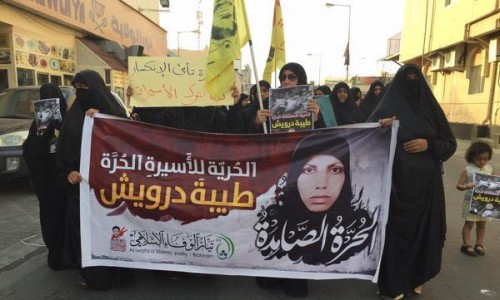**Update: Bahraini political prisoner Taiba Darwish completed her reduced three-year sentence and was released from Isa Town Women’s Prison on Monday, 14 May 2018.
On 18 April 2018, a Bahraini appeals court reduced the sentence against political prisoner Taiba Darwish from five to three years in prison. Darwish was arbitrarily imprisoned in 2016 in reprisal for housing pro-democracy activists. While the reduced sentence is welcomed, the Government of Bahrain continues to hold Darwish on politically motivated charges in poor detention conditions. She must be released at once.
In March 2016, Bahrain sentenced Darwish to five years in prison for “harboring fugitives” after she leased part of her home to several activists in order to help support her ill husband and three children. Bahraini authorities commonly employ this charge to collectively punish whole families or homeowners for their connection to protesters. According to the European-Bahraini Organisation for Human Rights (EBOHR), Darwish was not even aware of the tenants’ involvement in the pro-democracy movement.
During interrogation and detention, Bahraini authorities subjected Darwish to ill treatment. She suffered from uterine fibroids prior to her detention and her health has deteriorated in prison. Though the authorities took her to a military hospital for treatment in April 2016, they did not allow her to receive a direct examination; instead, they instructed the doctor to use a police officer as an intermediary. Darwish was not provided with a medical report, and the authorities threatened to remove her uterus if her condition did not improve. She has since developed additional problems in her kidneys, but the authorities have denied her consistent medical treatment. Zainab al-Khawaja, a human rights defender who was previously incarcerated along with Darwish, reported that prison officials used to specifically harass Darwish because she was a political prisoner.
The number of female political prisoners has grown as the Bahraini government increasingly targets women human rights defenders and activists for reprisal. Bahraini authorities repeatedly detained and tortured human rights defender Ebtesam al-Saegh in 2017, for example, in retaliation for her work with the United Nations (UN). They also imposed arbitrary bans on her travel to prevent her from attending sessions of the UN Human Rights Council.
Female prisoners like Darwish and al-Saegh often face further abuses in Bahrain’s Isa Town Women’s Prison. On 20 March 2018, Hajer Mansoor Hassan – who was arbitrarily imprisoned in retaliation for the human rights work of her son-in-law, exiled activist Sayed Ahmed Alwadaei – launched a hunger strike to protest the prison’s poor living conditions and harassment from the guards. Medina Ali, another political prisoner, joined the hunger strike on 22 March 2018, and the same day Hassan was rushed to the hospital as her health deteriorated. Alwadaei’s organization, the Bahrain Institute for Rights and Democracy (BIRD), reports that the prison authorities have since punished Ali for continuing the strike, including by stripping her naked in an attempt to humiliate her. Ali stated that other prisoners did not undergo such degrading treatment because they were not considered political prisoners. The Ministry of Interior (MOI) official in charge of Isa Town, Major Maryam Al-Bardouli, threatened to revoke her family visitation and phone call rights if she did not stop protesting ill treatment at the prison.
Though it is good to see Taiba Darwish’s sentence reduced, she and her fellow political prisoners should not be incarcerated in the first place. Bahrain must observe its international obligations to meet fair trial standards and the minimum rules for treatment of prisoners. Specifically, the Bahraini government must immediately release individuals imprisoned only in reprisal for alleged political or human rights activity, like Taiba Darwish.





